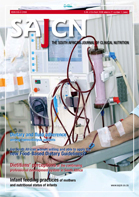Dietary and fluid adherence among haemodialysis patients attending public sector hospitals in the Western Cape
Keywords:
dietary, fluid, adherence, haemodialysis
Abstract
Objective: There has been considerable debate about the extent to which social cognitive models of health behaviour apply in developing countries. The purpose of this paper was to determine the applicability of the Theory of Planned Behaviour (TPB) in predicting dietary and fluid adherence among a sample of haemodialysis patients attending public sector hospitals in the Western Cape. Design and methods: A sample of 62 historically disadvantaged patients undergoing haemodialysis completed a battery of psychometric instruments measuring attitudes, subjective norms, perceived behavioural control regarding dietary and fluid adherence, health literacy, perceived social support, and self-reported dietary and fluid adherence. Interdialytic weight gain (IDWG), predialytic serum potassium levels, and predialytic serum phosphate levels served as biochemical indicators of dietary and fluid adherence. Results: Regression analyses indicated that the linear combination of attitudes and perceived behavioural control significantly accounted for 15.5% of the variance in self-reported adherence (a medium-effect size) and 11.4% of the variance in IDWG (a modest-effect size). No significant predictors were identified for predialytic serum potassium and predialytic serum phosphate levels. Interpretation and conclusions: The results indicate that, while the TPB may not function in the same manner as it does in Western samples, it may have some nuanced applicability among haemodialysis patients attending public sector hospitals in the Western Cape.
Published
2008-05-05
How to Cite
Fincham, D., Kagee, A., & Moosa, R. (2008). Dietary and fluid adherence among haemodialysis patients attending public sector hospitals in the Western Cape. South African Journal of Clinical Nutrition, 21(2), 7-12. Retrieved from http://sajcn.co.za/index.php/SAJCN/article/view/240
Issue
Section
Original Research
Material submitted for publication in the South African Journal of Clinical Nutrition (SAJCN) is accepted provided it has not been published elsewhere. Copyright forms will be sent with acknowledgement of receipt and the SAJCN reserves copyright of the material published.
The SAJCN does not hold itself responsible for statements made by the authors.


